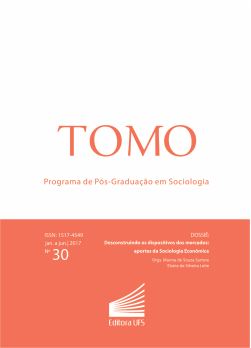Beyond rationality - the complexities inherent in the relationship among economics, politics and the media
DOI:
https://doi.org/10.21669/tomo.v0i0.6711Abstract
The present article intends to debate the elucidation of the com- plexities inherent in the context of the economy and its inter- section with the political and media fields. It emphasizes socio- logical contributions specifically from Economic Sociology, to deconstruct rationalities and objective positions that reverbera- te in the political scene through the media. It demonstrates the social tensions and group movements behind economic pres- criptions and debates, drawing attention to the fact that devices, laws and norms originating in the Economy do not depend sole- ly on the rational models produced by the homo economicus, but rather are constructions coming from cultural clashes between worldviews and their advocacy groups. To this end, this article drawns on the specific moment in the Brazilian political scene concerning the dispute over the transition between the FHC and Lula governments, between 2002 and 2003, and the attempts to connect the new government with the possibility of an economic crisis due to its political position.Downloads
Downloads
Published
How to Cite
Issue
Section
License
TOMO journal adopts the Creative Commons CC-BY 4.0 license which allows:
• Share: copy and redistribute the material in any medium or format.
• Adapt: remix, transform, and create from the material for any purpose, even commercial.
Authors who publish in this journal agree to the following terms:
a) Authors retain copyright and grant the journal the right of first publication, with the work simultaneously licensed under the Creative Commons which allows sharing the work with acknowledgment of authorship and initial publication in this journal.
b) Authors are authorized to assume additional contracts separately, for non-exclusive distribution of the version of the work published in this journal (eg, publishing in an institutional repository or as a book chapter), with acknowledgment of authorship and initial publication in this journal.
c) Authors are allowed and encouraged to publish and distribute their work online (e.g., in institutional repositories or on their personal page) at any point before or during the editorial process, as this can generate productive changes, as well as increase the impact and citation of the published work (O Efeito do Acesso Livre).







 The manuscripts from thsi journals are licenced by CC BY.4.0.
The manuscripts from thsi journals are licenced by CC BY.4.0. 